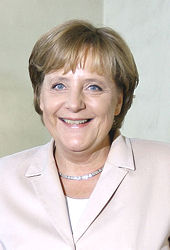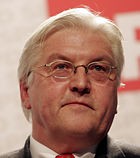German federal election, 2017
From Usgs
(Formating) |
|||
| (3 intermediate revisions not shown) | |||
| Line 1: | Line 1: | ||
| + | {| border=0 align=right class="toccolours" style="font-size: 90%;" | ||
| + | | colspan=4 | <center>[[German federal election, 2009|< 2009]] | [[Image:Germany_small.png]] | [[Next German federal election|Next >]]</center> | ||
| + | {| border=0 align=right cellpadding=4 cellspacing=4 width="100%" style="background:#f9f9f9; text-align:center;" | ||
| + | | bgcolor=#CCCCFF | <font style="font-size:12pt">'''German federal election, 2017'''<br>All 614 seats to the Bundestag</font> | ||
| + | |} | ||
| + | |- | ||
| + | | | ||
| + | | <center>[[Image:AMerkel.jpg|100px]]</center> | ||
| + | | <center>[[Image:FWSteinmeier.jpg|100px]]</center> | ||
| + | |- | ||
| + | | Leader | ||
| + | | <center>'''[[Angela Merkel]]'''</center> | ||
| + | | <center>[[Frank-Walter Steinmeier]]</center> | ||
| + | |- | ||
| + | | Party | ||
| + | | <center>'''CDU-CSU'''</center> | ||
| + | | <center>SPD</center> | ||
| + | |- | ||
| + | | Leader since | ||
| + | | <center>2000</center> | ||
| + | | <center>Unknown</center> | ||
| + | |- | ||
| + | | Last election | ||
| + | | <center>269 seats, 44%</center> | ||
| + | | <center>166 seats, 21%</center> | ||
| + | |- | ||
| + | | Seats won | ||
| + | | <center>'''246'''</center> | ||
| + | | <center>187</center> | ||
| + | |- | ||
| + | | Seats change | ||
| + | | <center>-23</center> | ||
| + | | <center>+21</center> | ||
| + | |- | ||
| + | | Percentage | ||
| + | | <center>39%</center> | ||
| + | | <center>30%</center> | ||
| + | |- | ||
| + | | Swing | ||
| + | | <center>-5%</center> | ||
| + | | <center>+9%</center> | ||
| + | |} | ||
| + | |||
| + | The '''19th German federal election, 2017''' was conducted in 2017 to elect members to the Bundestag (lower house) of [[Germany]]. | ||
| + | |||
==Overview== | ==Overview== | ||
| + | |||
| + | The major issues of the election were the economy and immigration. The [[Angela Merkel]] led CDU-CSU government was helped by its tough stance on immigrants but hurt by Germany's economic performance and its recession in 2015. The opposition SPD, led by [[Frank-Walter Steinmeier]], was helped by the focus on the economy, but hurt by it's less aggressive stance on immigration. | ||
==Election results== | ==Election results== | ||
| + | |||
| + | The election saw a shift in voter support move from the Greens-Left and CDU-CSU to the SPD and from the FDP to the NPD. The success of the NPD in achieving over 5% of the vote meant a removal of overhang seats in the Bundestag, reducing the overall number of seats in the chamber. | ||
{{German federal election results, 2017}} | {{German federal election results, 2017}} | ||
==Aftermath== | ==Aftermath== | ||
| + | |||
| + | With no single party having an absolute majority, there appeared to be 2 likely coalition groupings: a of the CDU-CSU/FDP coalition or a CDU-CSU/SPD grand coalition. What was understood to have been Merkel's prefered option, a CDU-CSU/NPD coalition, fell 1 seat short of absolute majority, as would a broad SPD/FDP/Greens-Left coalition. The result was a continuation of the 8 year old CDU-CSU/FDP coalition. | ||
==See Also== | ==See Also== | ||
Current revision as of 09:20, 27 January 2008
| ||||
 |  | |||
| Leader | | | ||
| Party | | | ||
| Leader since | | | ||
| Last election | | | ||
| Seats won | | | ||
| Seats change | | | ||
| Percentage | | | ||
| Swing | | | ||
The 19th German federal election, 2017 was conducted in 2017 to elect members to the Bundestag (lower house) of Germany.
Contents |
Overview
The major issues of the election were the economy and immigration. The Angela Merkel led CDU-CSU government was helped by its tough stance on immigrants but hurt by Germany's economic performance and its recession in 2015. The opposition SPD, led by Frank-Walter Steinmeier, was helped by the focus on the economy, but hurt by it's less aggressive stance on immigration.
Election results
The election saw a shift in voter support move from the Greens-Left and CDU-CSU to the SPD and from the FDP to the NPD. The success of the NPD in achieving over 5% of the vote meant a removal of overhang seats in the Bundestag, reducing the overall number of seats in the chamber.
| German federal election, 2017 | |||||
|---|---|---|---|---|---|
| Party | Seats | Net Gain/Loss | Vote | +/- | |
| Christian Democratic Union-Christian Social Union (I) | 246 | -23 | 39% | -5% | |
| Social Democratic Party | 187 | +21 | 30% | +9% | |
| Free Democratic Party | 66 | -56 | 10% | -8% | |
| National Democratic Party | 61 | +46 | 10% | +8% | |
| Greens-Left Party | 54 | -15 | 9% | -3% | |
| Total | 614 | -27 | |||
| Source: CDU/CSU wins election, reduced majority | |||||
Aftermath
With no single party having an absolute majority, there appeared to be 2 likely coalition groupings: a of the CDU-CSU/FDP coalition or a CDU-CSU/SPD grand coalition. What was understood to have been Merkel's prefered option, a CDU-CSU/NPD coalition, fell 1 seat short of absolute majority, as would a broad SPD/FDP/Greens-Left coalition. The result was a continuation of the 8 year old CDU-CSU/FDP coalition.
See Also
External links
| German federal elections |
|---|
| 2009 | 2017 | Next |
